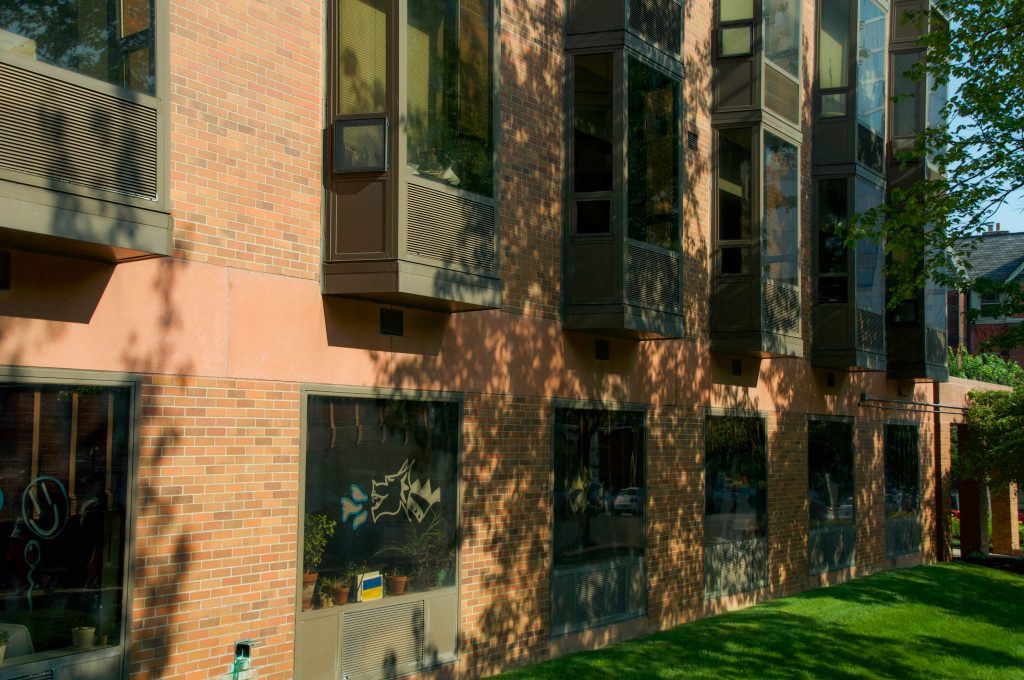
In the rush of campus life, it is easy to overlook the people who quietly hold it all together. Humans of Drexel is a series that brings those stories to light – celebrating the everyday heroes who turn this campus into a community. One such paragon is Taj McCoy, the heart and humor behind Towers Hall.
Taj – Tower Hall’s residential desk coordinator – arrived at Drexel with no master plan. What started as a practical choice quickly became something more. “I realized a lot of these students didn’t really know how to transition into adulthood. They were legally adults, sure – but they didn’t have the tools. And I thought, okay, I need to step up. I can help them become better adults. That makes sense to me.”
That quiet sense of duty has defined how Taj shows up in Towers Hall. Whether he is helping someone figure out a combination lock – “I’ll drag you to your locker and sit right next to you, and make you follow my lead until you get it” – or making sure every resident feels like they belong, he approaches the role with one consistent principle: connection. “When camaraderie is high,” he says, “we work better, communicate better. I will always make sure that people have open lines of communication”
What started as just a job quickly turned into a calling. He became a lifeline, the kind of presence students did not know they needed until they were face-down crying in the dorm hallway, locked out of their room or silently unraveling under the pressure of midterms and imposter syndrome.
And yet, Taj insists he is not that deep. “I’m irritating to a lot of people,” he laughs. “But I really do care. Even when I’m thinking that, ‘Wow, you are such a butthead’ – I’d still do everything in my power to make sure they’re okay. Even buttheads deserve love.”
It is this kind of almost parent-like love that has made Taj a crowd favorite in the Drexel community. “You know what really gets me?” he says. “When a student who lived here two or three years ago comes back and asks, ‘Is Taj still here? Can I talk to him real quick?’ And then they say, ‘You made my first year really good.’ That hits me. I’m just like – wow. Thank you, I appreciate that.” Even outside Towers, the legend lives on. “There was this post on Instagram earlier this year – someone said, ‘I hate that bald guy in Towers.’ And I was like, yeah, that sounds about right,” he laughs. “But then all these people jumped in and protected me. So I made a meme with Deadpool doing heart hands and captioned it, ‘Same, besties.’ I fight back with memes.”
That humor, paired with an uncanny ability to make people feel seen, is exactly what Taj brings to Towers – and it is what makes the building feel like his own. “One of the things I do is make memes. I’ll put names on them and tape them up on doors,” he says. “A lot of them are like, ‘Did you check your mailbox?’ It’s silly, but it gets people to laugh—and to check their mailbox.”

But Taj’s signature contribution isn’t just memes – it’s a whole persona. “You ready for this?” he grins. “I’ve developed an aesthetic, leaning into the performance,” but the role he is playing is one he has chosen deliberately. “I’ve decided my aesthetic is corny uncle,” he explains. “Everyone has one. The uncle who has really bad jokes, and sometimes good advice. So while you may not like that corny uncle, that corny uncle will open up that door to you in the middle of night and be like, yeah, now come on in. There’s a couch. We’ll talk about it in the morning.” That is the role Taj plays – not just because it is funny, but because it is familiar, disarming and, more importantly, safe.
But even that persona is still just one layer. “There’s the on-stage me, and then there’s the behind-the-scenes me,” he admits. “No one’s actually out here raw-dogging life without a mask. Everyone wears one.” And that’s something that a lot of people don’t really understand, that the person that you meet may not be the actual person, but actually their coping mechanism. Taj’s may come wrapped in dad jokes and Deadpool memes – but it is no less real, or necessary, than anyone else’s.
That understanding becomes crucial in the more unexpected parts of his job. “Sometimes, you run into situations where someone really needs intervention,” he explains. “You have to step in. You have to protect them. And sometimes, you have to be the one who tells them, ‘You can stand up for yourself.’” Adding on he says, “And I’m proud of myself for stepping up – but more than that, I’m proud of those students for fighting through it.” Does it take a toll? “Definitely,” he says without hesitation. “But some prices are worth paying.”
That’s why Taj always tells students: trust your RDCs. “If you’ve got a problem, come to the front desk. No one is going to hold your hand through everything – and they shouldn’t,” he says. “Your parents dropped you off and let go. That hand won’t ever be held the same way again, because your hands grow while you’re away from them. But someone will always be here. Just reach out.”
Because at the end of the day, Taj is not just teaching people how to open mailboxes – he is teaching them how to stand on their own. With patience, a meme or two and a corny joke when it counts, he reminds Drexel students that growing up does not have to mean going it alone.


